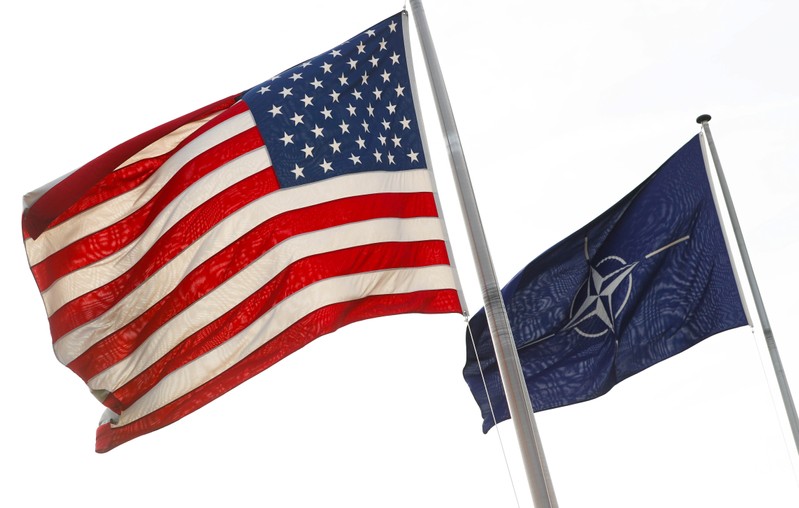
NATO and U.S. flags fly at the entrance of the Alliance’s headquarters during a NATO foreign ministers meeting in Brussels, Belgium March 31, 2017. REUTERS/Yves Herman
October 25, 2018
By Robin Emmott
BRUSSELS (Reuters) – European members of NATO urged the United States on Thursday to try to bring Russia back into compliance with a nuclear arms control treaty rather than quit it, diplomats said, seeking to avoid a split in the alliance that Moscow could exploit.
In a closed-door meeting at NATO, Pentagon, U.S. State Department and National Security Council officials briefed alliance envoys on U.S. President Donald Trump’s decision to pull out of the 1987 Intermediate-range Nuclear Forces Treaty, which rid Europe of land-based nuclear missiles.
Diplomats present said Germany and other European allies called for a final effort on Washington’s part to convince the Kremlin to stop what the West says are violations, or possibly renegotiate it to include China.
“Allies want to see a last-ditch effort to avoid a U.S. withdrawal,” one NATO diplomat said on condition of anonymity because of the classified nature of the meeting, which took place two days after senior U.S. official John Bolton informed Russian President Vladimir Putin of the plans in Moscow.
“Nobody takes issue with Russia’s violation of the treaty, but a withdrawal would make it easy for Moscow to blame us for the end of this landmark agreement,” a second diplomat said.
NATO declined to comment on the details of the meeting but issued a statement saying that allies assessed “the implications of Russia’s destabilizing behavior on our security.”
“NATO allies will continue to consult on this important issue,” it added.
Earlier this week, NATO Secretary-General Jens Stoltenberg laid the blame on Russia for violating the treaty by developing the SSC-8, a land-based, intermediate-range Cruise missile which also has the name of Novator 9M729.
Russia denies any such violations.
NATO allies including Belgium and the Netherlands, which host U.S. nuclear weapons facilities in Europe, warned in the North Atlantic Council, NATO’s highest decision-making body, of a public outcry if the United States were to try to install medium-range nuclear weapons on their territory again.
Stoltenberg said on Wednesday he did not think this would lead to reciprocal deployments of U.S. missiles in Europe as happened in the 1980s.
European allies see the INF treaty as a pillar of arms control and, while accepting that Moscow is violating it by developing new weapons, are concerned its collapse could lead to a new arms race with possibly a new generation of U.S. nuclear missiles stationed on the continent.
Diplomats said the U.S. officials did hold out the possibility that the United States may delay its formal withdrawal to after a planned meeting between Putin and Trump in Paris on Nov. 11.
The treaty foresees a six-month notification period for any withdrawal, also potentially giving Washington time to negotiate with Moscow before finally pulling out.
(Reporting by Robin Emmott; Editing by Hugh Lawson)

